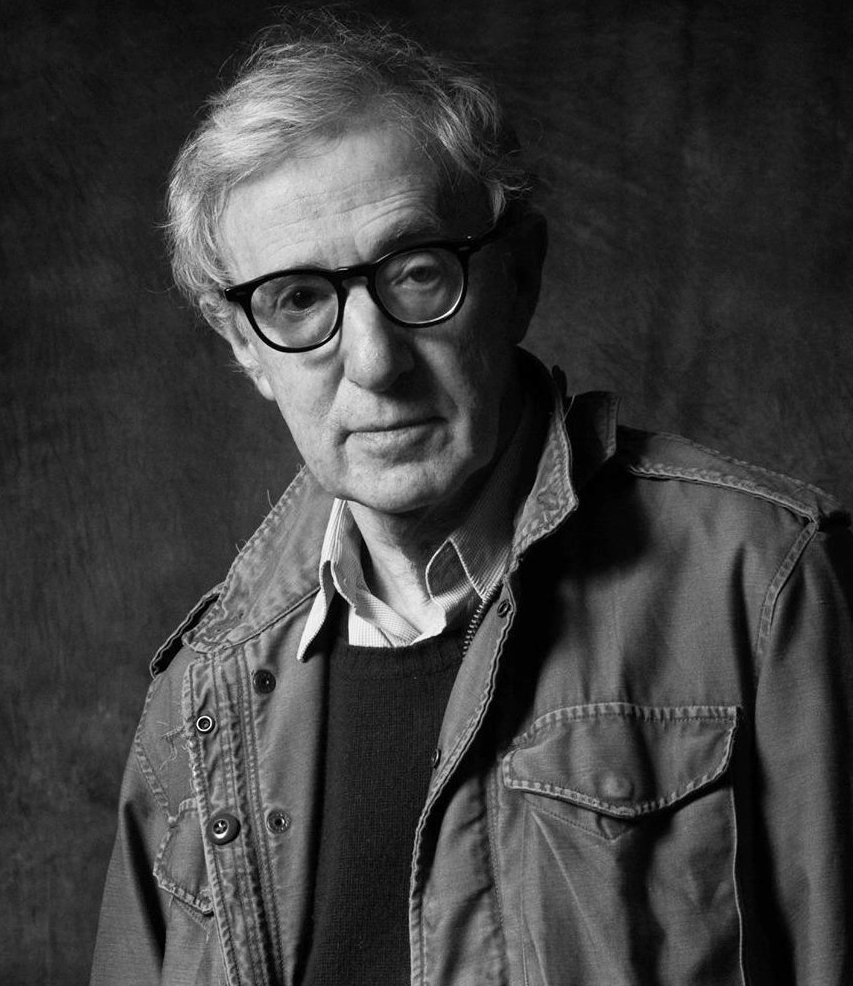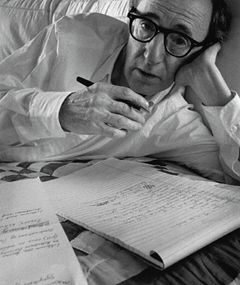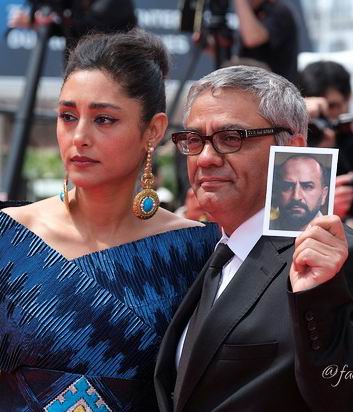|
|
| Welcome to Online Film Home! |
|---|
|
|
|

Allen, Woody |
Birth name
Allen Stewart Konigsberg
Date of birth
1 December 1935 Brooklyn, New York, U.S.
Woody Allen (December 1, 1935, Brooklyn, New York, U.S.)
Actor, director, screenwriter, and playwright Woody Allen redefined film comedy during the 1970s, bringing a new measure of sophistication and personal complexity to the form.
Born Allen Stewart Konigsberg in Brooklyn, NY, on December 1, 1935, he adopted his stage name at the age of 17, and in 1953 enrolled in NYU’s film program, and soon dropping out of school to begin writing for comedian David Alber.
Two years later, Allen graduated to writing for television; during his five-year in television, his efforts won him an Emmy nomination.
He eventually decided to try his hand as a stand-up performer. After slowly gaining a reputation on the New York-club circuit, he became a frequent talk show guest and in 1964 issued his self-titled debut comedy LP.
“Comedy just pokes at problems, rarely confronts them squarely. Drama is like a plate of meat and potatoes, comedy is rather the dessert, a bit like meringue.”

With 1966’s What’s Up, Tiger Lily?, a puckish re-tooling of a Japanese spy thriller complete with his own story line and dubbed English dialogue, he made his directorial debut.
In 1969 Allen directed two short films for a CBS television special. However, Allen’s career as a filmmaker fully took flight with the gangster send-up Take the Money and Run (1969), in which he starred, co-wrote, and directed.
His status as an auteur was further solidified with 1971’s Bananas and the following year’s episodic Everything You Always Wanted to Know About Sex…
Allen next appeared in Herbert Ross’ 1972 feature Play It Again, Sam, followed by his own return to the director’s chair for 1973’s futuristic comedy Sleeper.
While remaining as outlandish as his previous work, 1975’s period comedy Love and Death signaled Allen’s desire for respect as a serious filmmaker.
Allen’s breakthrough was 1977’s Academy Award-winning Annie Hall. A major commercial hit as well as a critical success, Annie Hall announced a new era of intelligence and complexity in American comedies.
Allen himself subsequently turned away from humor completely with 1978’s Interiors, a brooding drama inspired by the films of his hero Ingmar Bergman, which earned a pair of Oscar nominations.
His 1979’s Manhattan, was widely hailed as a masterpiece, and remains his definitive work. Its follow-up, 1980’s Stardust Memories, recalled Federico Fellini’s 8 1/2; while Bergman, along with William Shakespeare, was again the inspiration behind 1982’s A Midsummer Night’s Sex Comedy.
Hannah and Her Sisters won favorable comparisons to Chekhov, and earned Allen his second Oscar for Best Original Screenplay.
After Radio Days, he entered into another Bergman-like phase, directing two dramas, September and Another Woman, which failed to find favor with audiences or critics, while his Crimes and Misdemeanors (1989), ended scoring three Academy Award nominations.
Both 1990’s Alice and 1992’s Shadows and Fog were negligible at best, but he returned to form with Husbands and Wives, a cinéma vérité look at a crumbling marriage.
In 1994, he returned to critics’ good graces with the period comedy Bullets Over Broadway, which garnered an impressive seven Oscar nominations, while 1995’s Mighty Aphrodite scored two more Academy nods.
In 1996, Allen directed his first-ever musical comedy, Everyone Says I Love You, which got generally positive reviews. However, Deconstructing Harry followed in 1997 to vehemently mixed reviews, as did 1998’s Celebrity.
Almost in direct response to these sentiments, Allen released a string of lighthearted films, beginning with critically acclaimed Sweet and Lowdown in 1999. . 2000’s Small Time Crooks enjoyed a healthy run at the box office and decent reviews.
Though Allen wasn’t as lucky with the noir comedy Curse of the Jade Scorpion (2001) or his moviemaking farce Hollywood Ending, the latter film opened the 2002 Cannes Film Festival and marked his appearance in Cannes.
Allen’s next pair of films, Anything Else and Melinda and Melinda, continued his trend of mixed-reviewed comedies, but in 2005, he changed the setting of his work to Britain and delivered what many considered his best film in years with the dark drama Match Point.
Perhaps hoping she might be his lucky charm, the filmmaker cast Johansson again in the following year’s so-so mystery-comedy Scoop, and continued to explore the dark corners of the other side of the Atlantic with the star-studded Cassandra’s Dream in 2007. --allmovie
Selected filmography of
Allen, Woody
2023
Coup de chance (2023)
2017
Wonder Wheel (2017)
2016
Café Society (2016)
2013
Blue Jasmine (2013)
2012
To Rome with Love (2012)
2011
Midnight in Paris (2011)
2008
Vicky Cristina Barcelona (2008)
2005
Match Point (2005)
2000
Small Time Crooks (2000)
1994
Bullets Over Broadway (1994)
1990
Alice (1990)
1989
Crimes and Misdemeanors (1989)
1988
Another Woman (1988)
1986
Hannah and Her Sisters (1986)
1985
The Purple Rose of Cairo (1985)
1979
Manhattan (1979)
1978
Interiors (1978)
1977
Annie Hall (1977)
1975
Love and Death (1975)
1973
Sleeper (1973)
|
|
|
|

Cannes 2024 |
Choose an item to go there!
|
| |
|
|

